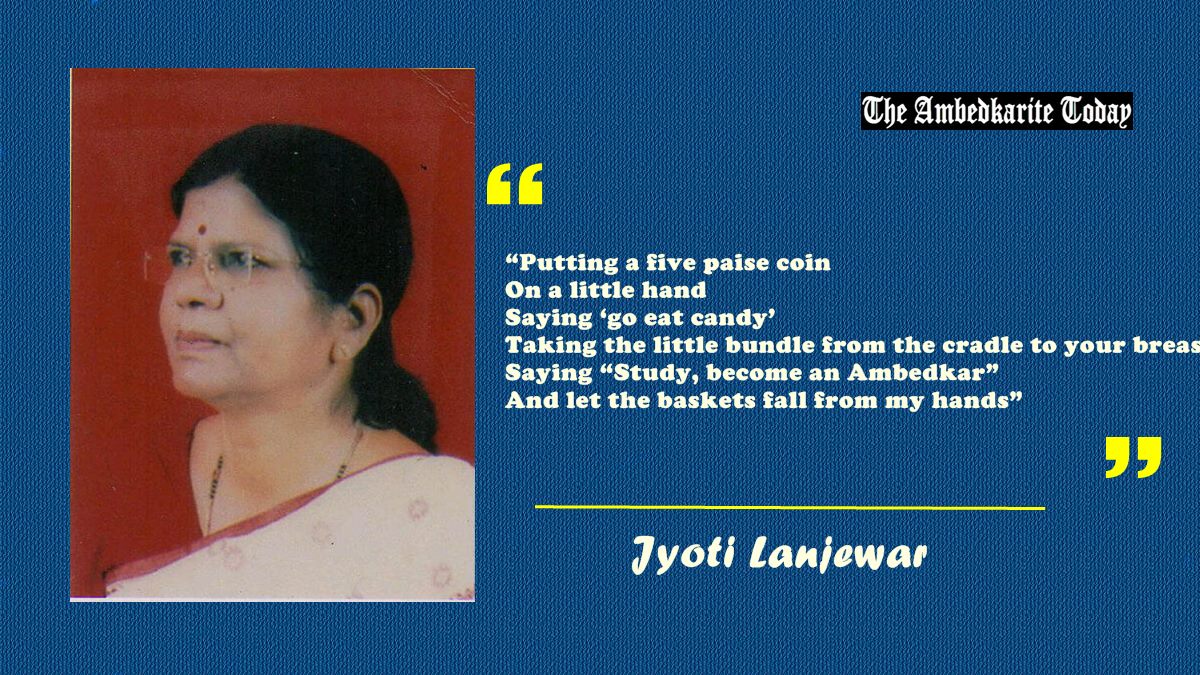Jyoti Lanjewar, a Marathi Dalit writer and activist, has a silent presence in the literary historical landscape. While she is known in many Dalit literary circles for her evocative writing, not much literature is dedicated to acknowledging her strides in revolutionising the Dalit-feminist consciousness. Through her poetry and thought, Jyoti Lanjewar exposed the patriarchal underpinnings of the private/public duality that kept the Dalit women on the sidelines of the anti-caste movement. She actively advocated for a Dalit-feminist identity that put Dalit women at the center of the movement and hit out at erasure of herstory.
Her literary works include Disha (Direction), published in 1982 and Ajūna vādaḷa uṭhalē nāhī (No Storms Still Rise), published in 1992. Her most recent work is a collection of her selected poems, titled Red Slogans on the Green Grass, compiled and translated in English by her daughter Dr. Aparna Lanjewar-Bose. She has been honoured with many awards like the Padmashri Daya Pawar Puraskar, Lokmitra Award, and Dalit Mitra Award.
Early Life And Impetus On Education
Jyoti Lanjewar was born on 25 November, 1950 to a middle-class Dalit family in Nagpur. Since her childhood, she was encouraged by her family to emulate the Ambedkarite principle of education as means to agitation. Jyoti Lanjewar, as a result, grew up developing a deep consciousness of caste politics and praxis. She alludes to this event in her poem Mother:
“Putting a five paise coin
On a little hand
Saying ‘go eat candy’
Taking the little bundle from the cradle to your breast
Saying “Study, become an Ambedkar”
And let the baskets fall from my hands”
She followed in the steps of Ambedkar and went on to receiving a PhD in Marathi. Soon after, she secured a permanent professorship at Shree Binzani City College, Nagpur University. She even served as the college’s Head of Department of Marathi until her retirement. She was also an active member of the Republican Party of India (Atthawale) and presided over its women’s front.
Poetry As A Means To Protest
Jyoti Lanjewar’s poetic vision is shaped by her acute understanding of the interplay of caste and gender in the formation of Dalit identity. She uses her poetic license to carefully weave a herstory, highlighting the invaluable role of women in the Dalit movement. In her poem Mother, she alludes to the Namantar Andolan (1978-1994) and her mother’s unswerving devotion to the cause:
“I have seen you
At the front of the Long March
The end of your sari tucked tightly at the waist
Shouting “Change the name”
Taking the blow of the police stick on your upraised hands
Going to jail with head held high”
Jyoti Lanjewar’s ‘woman’ defies any categorisation forged out of patriarchal gaze. She dismantles the private/public duality and redeems the invisible labours of her ‘woman’, both in the anti-caste movement and in the confines of her home. She illustrates the exploitation of Dalit women on double counts of caste and gender and constructs a new Dalit-feminist identity.
Jyoti Lanjewar’s experience is further pronounced by raging industrialism in the post-independence India. The tone of her poetry is brazen and sharp, searing through the farce of ‘development’ and exposing the forces of capitalism that recede the Dalits further into the margins. She writes in her poem Dark Alley:
“In this historical dark alley
There’s a four winged Wada
Inside it on the weather battered walls
Some parrots sit routinely
With them a few maina too interlocute
On matters of private interest
When opened – the hewn stoned doors of the Wada creak
For some they are wide open… for some shut fast”
Jyoti Lanjewar’s work is provocative and subversive. Maya Pandit, a translator/activist, aptly says that Lanjewar “asserted [her] protest in [her] poetry, which transformed the very idiom of protest.” Her poetry is a rallying cry to eviscerate the Hindu Brahminical-Patriarchal-Capitalist triad of oppression. Jyoti Lanjewar’s poetry captures the Dalit-feminist experience that does away with the trope of passive endurance and builds a Dalit-feminist identity that actively resists and challenges these oppressive power structures.
Death And Legacy For a Dalit-Feminist Future
After retirement, Lanjewar continued to work with the Republican Party of India (Atthawale) to echo the voices of Dalit women and advocate for an inclusive political space. Her lifelong dedication to the Ambedkarite principle of educating and agitating came to an end as she quietly passed away on 8th November, 2013. When the news of her demise broke through local news outlets, she was endearingly remembered as an Ambedkarite thinker and poet. However, it is just as important to note Jyoti Lanjewar’s unconventional treatment of womanhood. She leaves in her wake a rich literature of resistance, speaking for a generation of women who continue to face triple marginalisation through casteism, patriarchy, and capitalism.
Editors Note – This Article was appeared first on Feminism in India written by Shrishti gupta.

